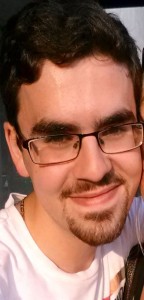“IF DARYL DIES, WE RIOT.”
On any autumn afternoon this past fall, there was a good chance you could find me strutting around campus celebrating the return of one of my favorite shows — The Walking Dead — with those words etched upon my T-shirt.
The show, known for mercilessly killing off fan-favorite characters, has inspired many of these paranoid products. The idea behind the shirt is simple: You take away our beloved character, and we’ll take it to the streets.
In October, while anxiously awaiting the premiere of the program’s latest season, I found myself perusing the day’s news and caught a newscast online, where a different kind of “rioting” was being discussed.
The segment showed the latest developments in Ferguson, Missouri, where the tragic shooting of Michael Brown had led to numerous large scale protests. On it, words like “violent” and “thugs” were carelessly thrown around by spectators and commentators.
As I watched this, the weight of my shirt suddenly multiplied tenfold, smothering my every breath.
It dawned on me: Here I was, donning a T-shirt saying I’d riot over the death of a fictional character, while others were out there protesting for real causes — for justice, for peace, for their livelihoods.
The pundits on the newscast had no such epiphany. They continued to trivialize and mischaracterize the protesters as needlessly violent.
I kept thinking, “What would happen if I were to actually take up the cause printed on my chest? Would I be portrayed as ‘rowdy’ or as a ‘menace’?”
Far too often, when white people — like myself — riot over dumb causes, it’s described along the lines of “tomfoolery.”
But meanwhile, the many black Ferguson protesters — on the streets out of desperation, out of necessity — are often cast as much more than just a nuisance. And the implications run deep.
This is but one of a countless number of privileges I am afforded as a white person in modern-day America. Social status, wealth, power — it’s a smorgasbord of entitlements that many of us feast on without question.
But this duality is far too simplistic. Inequality and injustice runs much deeper than black or white.
Take me for example. I’m a white, straight, highly-educated, middle-class male attending a top university in the United States. How much more privileged can I be?
I say this not to boast — quite the opposite, in fact. These markers, at the intersection of my identity, denote a laundry list of privileges that I have absolutely no entitlement to. And yet I have them, and I unjustly reap their benefits daily, regardless of intent or cognizance.
This happened when I haggled with police officers after being pulled over, never truly fearing that the encounter could lead to violence, or worse: lethal force.
It happens anytime I go to a Lehigh party wearing just a t-shirt and jeans, while girls are pressured to wear six-inch heels and thigh-high dresses – clothing “choices” that are later use to rationalize and perpetuate a culture of rape and sexual assault.
It happened when I took on an unpaid internship to further my career, knowing that my mom could help me bear the unbearable costs of living while performing wage-less labor.
It happens anytime I kiss my girlfriend in public without fretting over judgment or intolerance. Or when we talk about getting married, unobstructed by voters in distant booths or judges in faraway courtrooms.
It happened when I flippantly joked about the “sketchiness” of south Bethlehem, not grasping the racial connotations of my comment. Or when I carelessly complained about its lack of cleanliness, not understanding that for its full-time residents, it’s simply a reality of their socioeconomic standing — it’s their home.
These are but a few samples of ways in which I, and countless other Lehigh students, benefit from our social standing, wealth and power. Our very presence here is a sign of some form of privilege.
It’s not just a matter of race or class or gender or sexual orientation, but rather an interconnected web of all of these markers, among others. And it begs our attention.
I’m a white guy and I know it, because I have to. I owe it to all of those who aren’t afforded the same privileges to live life forever cognizant of my advantages.
I owe it to them to live life with a purpose, not for myself but for others. Do unto others.
Because it’s not enough to just “mind the gap,” as I’ve stressed in this column — you must actively work to abolish it.
You may not agree with my ideas of what these “gaps” are, but injustices and inequalities are undeniable realities of our world. And if you are lucky enough to have the means to combat them, you must.
Whether it’s volunteering at a local non-profit, starting a club at school, holding a local rally, or even just writing a column in your collegiate newspaper, there are infinite ways to make a difference. So go out there and do it.
And if you must riot, make it for a just and worthwhile cause — make it not just for yourself, but for others too — because not all of us are afforded the same privileges.






Comment policy
Comments posted to The Brown and White website are reviewed by a moderator before being approved. Incendiary speech or harassing language, including comments targeted at individuals, may be deemed unacceptable and not published. Spam and other soliciting will also be declined.
The Brown and White also reserves the right to not publish entirely anonymous comments.
2 Comments
This is for sure Cristiano Lima’s at his best! I am so proud of him. You make my life make sense!
What nonsense…the assumption of guilt for no reason is not intellectually honest.